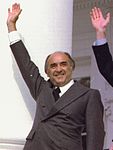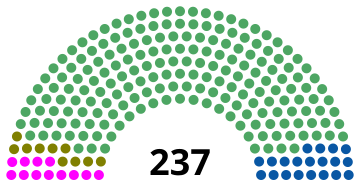|
1976 Mexican general election
General elections were held in Mexico on 4 July 1976.[1] José López Portillo was the only candidate in the presidential election, and was elected unopposed. In the Chamber of Deputies election, the Institutional Revolutionary Party (PRI) won 195 of the 237 seats,[2] as well as winning 64 seats in the Senate election.[a][4] Voter turnout was 65% in the Senate election and 62% in the Chamber election.[5] The deputies elected served during the 50th session of Congress (1976 to 1979), while the senators additionally served during the 51st session (1979–1982). BackgroundBefore the electoral reform of 1977, only four political parties were allowed to participate in the elections: the ruling Institutional Revolutionary Party (PRI), the Popular Socialist Party (PPS), the Authentic Party of the Mexican Revolution (PARM) and the right-wing National Action Party (PAN), which was practically the only real opposition party at the time.[6] The campaign and the elections took place during a tense period: the government's conflict with the private sector, the mounting economic issues (which would lead to a devaluation of the peso a month after the election), the leftist guerrilla uprisings in some parts of the country and the Dirty War the government took against them were some of the issues that outgoing President Luis Echeverría faced and which jeopardised the power of the ruling PRI. Nomination of the PRI presidential candidateSome of the PRI contenders for the party's 1976 presidential candidacy were:
In October 1974, the Instituto Mexicano de Opinión Pública (IMOP) carried out, for the first time in Mexican politics, an opinion poll to reveal the public's perceptions of the contenders and their chances to obtain the PRI presidential candidacy in 1976 and succeed Echeverría. 2,730 people were asked to choose which contender, in their opinion, better fit the following criteria:  
Muñoz Ledo would later recall that during this period, he received a visit from President Echeverría. During the meeting at Muñoz Ledo's house, Echeverría went to the garden and commented that it was "too small to receive delegations". Muñoz Ledo understood the phrase as meaning that he would be the chosen one to succeed him as President, interpreting Echeverría's comment as referring to the PRI delegations that would visit his house to congratulate him on his nomination, and so he decided to buy the land that was behind the garden so as to enlarge it. However, he would later discover that he had misinterpreted Echeverría's comment, and that he wasn't his chosen candidate.[10] In June 1975, Echeverría privately told López Portillo that he would be his successor,[11] and on 5 October he was officially nominated by the PRI as its presidential candidate for the 1976 elections.[12] The aforementioned Muñoz Ledo was then appointed both President of the PRI's National Executive Committee as well as General Coordinator of López Portillo's campaign,[13] while López Portillo appointed Julio Rodolfo Moctezuma as director of the party's Instituto de Estudios Políticos, Económicos y Sociales (IEPES).[14] Echeverría would later state that he chose López Portillo to succeed him because, as president, "I was aware that the country's main problem was the financial one", which should be faced by his Secretary of Finance, "who had shared with me the attacks of a reactionary and obtuse private sector, which did not hesitate to place its funds abroad in their eagerness to break me down".[11] Campaign  The PPS and the PARM supported López Portillo's candidacy, as they had traditionally done with previous candidates for the PRI. At the time, the opposition party PAN was going through internal conflicts and, for the first time upon its foundation, was unable to nominate a candidate for the 1976 presidential elections. On the other hand, the Mexican Communist Party nominated Valentín Campa as their presidential candidate. At the time, however, this party had no official registry and was not allowed to participate in elections, so Campa's candidacy was not officially recognized and he didn't have access to the media. He had to run as a write-in candidate, as he would not appear in the ballots.[15] These factors led to López Portillo effectively running unopposed. His campaign echoed this "unanimous" support for him, and his slogan was "La solución somos todos" ("All of us are the solution"). López Portillo later joked that, due to running without opposition, it would have been enough for "his mother's vote for him" to win the election.[16] López Portillo had been separated from his wife Carmen Romano for some time, but upon being nominated by the PRI as its presidential candidate, the two of them were persuaded by PRI advisers to reunite and to maintain the appearance of a solid marriage, so as to not alienate the largely conservative, catholic populace.[17] Popular Cuban singer Celia Cruz recorded a jingle for the López Portillo campaign, titled "¿Dónde estás, José?" ("Where are you, José"?). Other entertainers such as Enrique Guzmán and María Elena Velasco performed on an LP issued by the López Portillo campaign.[18][19] In his campaign, López Portillo defended the infamous acarreo ("hauling", the practice of trucking people to rallies to cheer its candidates in exchange for gifts of some kind),[20] saying that the attendees "are not ‘hauled’, they are ‘transported’ by the Party's own men and forces", adding that "All organized truck drivers in Mexico are part of the PRI and it is a tradition for them to take their vehicles to transport people to public events".[21] He further justified in his autobiography that there was "no reason not to facilitate, for example, to our peasants, transportation to public meetings, who concur, after all, to communicate with a System that governs them, through understandable acts in which they participate, see, hear, learn, express themselves and even, are distracted with trips and companies. The Party can, the Party must."[22] Results President
By state
SenateJorge Cruickshank García from the Popular Socialist Party was elected to the Senate for the state of Oaxaca. Although he ran in coalition with the PRI and therefore was not an opposition senator, he was the first Senator not to come from the PRI (or its predecessors) since 1929.[23][3]
Chamber of DeputiesFor this election, the Chamber of Deputies comprised a total of 237 deputies, of whom 196 were elected by majority vote in each electoral district and 41 more were party deputies, allocated in proportion to the votes that the non-winning parties obtained in the districts.
AftermathThere were many rumours that outgoing president Luis Echeverría was planning to carry out a coup d'état against his own candidate, López Portillo, to perpetuate himself in power.[citation needed] On 13 August, the Liga Comunista 23 de Septiembre tried to kidnap Margarita López Portillo, the president-elect's sister; the attempt failed and the Liga's leader, David Jiménez Sarmiento, was killed by security forces during the incident.[24] In the end, López Portillo took office as scheduled on 1 December without further incidents. Legitimacy in disputeAlthough the results ensured the PRI remained in power, the lack of opposition to José López Portillo raised concerns about the lack of legitimacy of the Mexican political system.[25][26] As a result, an electoral reform law was enacted in 1977, introducing partial proportional representation for the Congressional and Senate elections in order to ensure better representation of opposition parties – something extremely difficult under the first-past-the-post system that had been in force. However, the PRI retained its position as the dominant party, retaining the presidency until Vicente Fox of the National Action Party was elected in 2000. The 1976 elections were the last in which a presidential candidate ran unopposed. Notes
References
|
||||||||||||||||||||||||||||||||||||||||||||||||||||||||||||||||||||||||||||||||||||||||||||||||||||||||||||||||||||||||||||||||||||||||||||||||||||||||||||||||||||||||||||||||||||||||||||||||||||||||||||||||||||||||||||||||||||||||||||||||||||||||||||||||||||||||||||||||||||||||||||||||||||||||||||||||||||||||||||||||||||||||||||||||||||||||||||||||||||||||||||||||||||||||||||||||||||||||||||||||||||||||||||||||||||||||||||||||||||||||||||||||||||||||||||||||||||||||||||||||||||||||||||||||||||||||||||||||||||||||||||||||||||||||||||||||||||||||||||||||||||||||||||||||||||||||||||||||||



